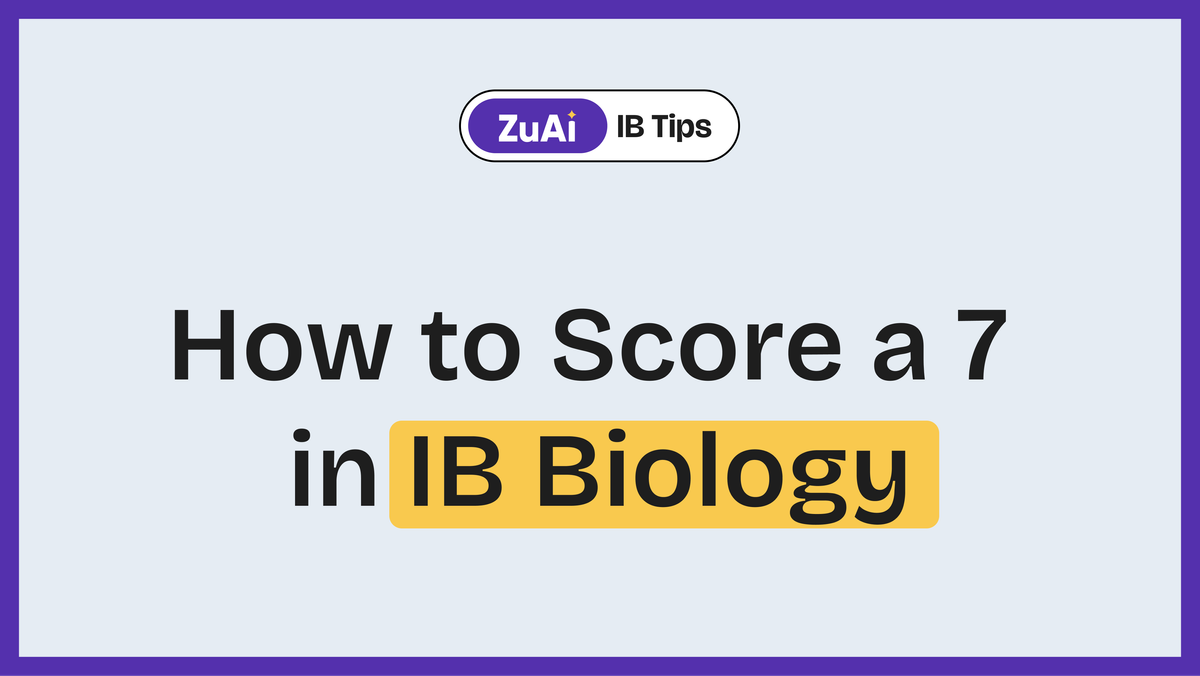How to Score a 7 in IB Biology: Top Study Tips and Strategies for N24 and M25

Author: Dr. Jane Mitchell, IB Biology Teacher and Examiner
Introduction
IB Biology is a challenging subject, but it’s also one of the most rewarding. Whether you’re passionate about genetics, ecology, or molecular biology, scoring a 7 in IB Biology requires consistent effort, deep understanding, and effective study techniques. With the N24 and M25 exam sessions approaching, it’s time to step up your study game and maximize your potential.
In this blog, we’ll dive into the top tips and strategies to help you score a 7 in IB Biology. From mastering the syllabus to refining your Internal Assessment (IA), these tips will help you excel in your coursework and exams.
Step 1: Understand the IB Biology Syllabus
The first step to success in IB Biology is having a clear understanding of the syllabus. The IB Biology syllabus outlines all the key topics you need to cover, from cell biology to ecology, as well as the core and higher-level (HL) material.
How to Use the Syllabus:
- Break it down: Divide the syllabus into manageable sections, such as genetics, ecology, and human physiology. This makes your study plan more organized.
- Highlight key concepts: Pay special attention to topics that frequently appear in exams, like photosynthesis, DNA replication, and enzyme activity.
- Know the assessment objectives: The IB Biology syllabus includes specific objectives that guide examiners on how to assess your knowledge. These range from recalling facts (Objective 1) to applying your understanding to new scenarios (Objective 3).
Pro Tip: Download a copy of the IB Biology syllabus and keep it nearby as you study. Use it to check off topics as you go and ensure you’re covering everything.
Step 2: Create a Consistent Study Schedule
Consistency is key when studying for IB Biology. The subject requires not just memorization but also understanding complex processes, so regular review is essential. Rather than cramming all your studying into a few weeks before the exam, spread it out over time.
How to Build a Study Schedule:
- Set weekly goals: Divide the syllabus into weekly chunks and set realistic study goals. For example, focus on cell biology for one week, genetics for the next.
- Use spaced repetition: Spaced repetition is a proven technique to retain information over time. Revisit topics multiple times, increasing the intervals between each review session.
- Incorporate active recall: Use flashcards, quizzes, or past paper questions to actively test your knowledge. The more you practice retrieving information, the better you’ll remember it.
Pro Tip: Use apps like Anki or Quizlet for flashcards and quizzes that align with your syllabus. Active recall and spaced repetition together can significantly improve your retention.
Step 3: Practice with Past Papers
One of the most effective ways to prepare for your IB Biology exam is by practicing with past papers. Past papers give you insight into the structure of the questions, the types of topics frequently tested, and how to manage your time during the exam.
Tips for Using Past Papers:
- Time yourself: Simulate exam conditions by completing past papers under timed conditions. This helps you get comfortable with the time constraints of the actual exam.
- Review mark schemes: After completing a past paper, compare your answers to the official IB mark scheme. Understanding how points are awarded will help you structure your answers to maximize marks.
- Identify patterns: Look for recurring themes and questions. Topics like natural selection, enzyme activity, and gas exchange frequently appear in exams.
Pro Tip: Don’t just focus on what you got wrong — also review your correct answers to ensure you fully understand why they are correct. This reinforces learning and improves confidence.
Step 4: Master Diagrams and Data Analysis
In IB Biology, diagrams and data analysis are key parts of both Paper 2 and Paper 3 exams. You’ll often need to draw biological structures or interpret graphs and experimental data.
How to Master Diagrams:
- Practice drawing: Make sure you can draw and label key diagrams, such as the structure of a cell, DNA, or the heart. These often appear in Paper 2, and well-labeled diagrams can score easy marks.
- Know your biological processes: Practice explaining processes like photosynthesis, cellular respiration, or mitosis alongside diagrams. Being able to link processes to diagrams can boost your answers.
How to Analyze Data:
- Familiarize yourself with graphs: Many questions in Paper 3 involve interpreting experimental data, such as growth curves or enzyme activity. Practice reading and analyzing graphs to spot trends and anomalies.
- Understand statistics: Know how to interpret error bars, standard deviation, and statistical significance. These are common in IB Biology exams and can help you interpret experimental data effectively.
Pro Tip: Make sure your diagrams are neat, clearly labeled, and relevant to the question. Examiners appreciate clarity, and messy diagrams can cost you marks.
Step 5: Perfect Your IB Biology Internal Assessment (IA)
Your Internal Assessment (IA) is worth 20% of your final IB Biology grade, so it’s crucial to get it right. The IA gives you the chance to explore a topic of your choice through an investigation or experiment. It’s a great opportunity to showcase your understanding of the scientific method and your ability to analyze data.
Tips for a Strong IA:
- Choose an interesting topic: Pick a research question that interests you and fits within the IB syllabus. Make sure your question is focused, clear, and testable.
- Plan thoroughly: A well-structured investigation is key to success. Clearly outline your hypothesis, variables, and method. Make sure your experiment is replicable and your data collection is accurate.
- Analyze your data: Don’t just present your results — interpret them. Discuss trends, correlations, and the reliability of your findings. Consider the limitations of your experiment and suggest improvements.
- Use correct terminology: The language of biology is precise, so make sure you use the correct terms when describing processes, variables, or data analysis.
Example IA Topic: Investigating the effect of different concentrations of salt solutions on the rate of osmosis in potato slices. This allows you to explore osmosis, a core concept in IB Biology, with clear independent and dependent variables.
Bonus Tip: AI app for IB Exams = ZuAI
It's the ultimate AI app designed to help your child excel in their IB exams. As a parent, you want the best for your child, and so do we.
ZuAI provides personalized study support, practice questions, and detailed explanations tailored specifically to the IB curriculum.
Think of it as a smart tutor who understands your child’s unique learning needs, helping them tackle challenging subjects with confidence.
With ZuAI, you can feel reassured knowing your child is getting the extra help they need to succeed and build a bright future.
We genuinely care about your child's success and are here to support them every step of the way.

Looking for free solutions to previous year's question papers? Check out ZuAI's YouTube channel.
FAQ Section
Q1: How much time should I dedicate to studying IB Biology each week?
A: Aim to study IB Biology for at least 6-8 hours per week, depending on your strengths and weaknesses. Consistency is key, so spread your study sessions across the week rather than cramming before the exam.
Q2: How important is my Internal Assessment (IA) in IB Biology?
A: Your IA is worth 20% of your final IB Biology grade, so it’s crucial to perform well. A well-structured, data-driven IA can significantly boost your overall score.
Q3: What’s the best way to memorize biological processes like photosynthesis or cellular respiration?
A: Break complex processes down into smaller steps, and use diagrams to visualize each stage. Practice explaining the processes in your own words and use flashcards or quizzes to test your memory.
Q4: How do I prepare for the IB Biology Paper 3 exam?
A: Paper 3 focuses on experimental work and data analysis. Practice interpreting data from experiments, and make sure you understand the different options available for your Paper 3 syllabus (e.g., Option A: Neurobiology or Option B: Biotechnology).
Q5: Should I focus more on core or higher-level (HL) topics in IB Biology?
A: If you're an HL student, make sure you thoroughly understand both the core and HL topics. HL students are often tested on more detailed and advanced questions, so dedicate additional time to these areas.
Conclusion
Scoring a 7 in IB Biology is no small feat, but with the right strategies and dedication, it’s absolutely achievable. Focus on understanding the key concepts, practice regularly with past papers, and refine your diagram skills and data analysis techniques. Don’t forget the importance of your IA, as it can significantly contribute to your overall score. By staying organized and consistent in your studies, you’ll be well-prepared to excel in the N24 and M25 sessions.
Good luck with your IB Biology journey — you've got this!
